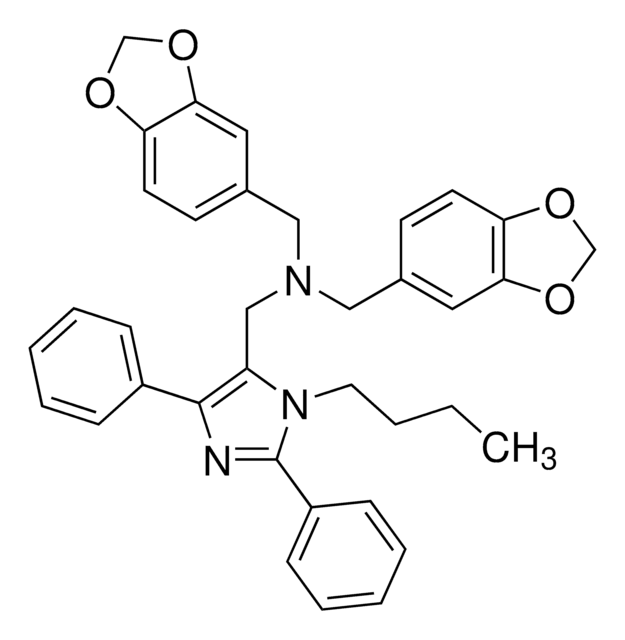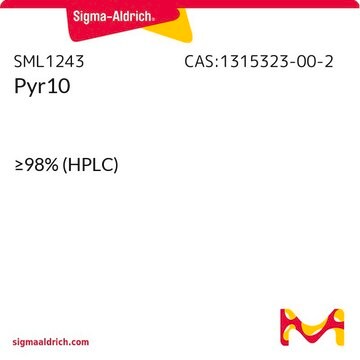SML2323
GSK1702934A
≥98% (HPLC)
Synonym(s):
1,3-Dihydro-1-[1-[(5,6,7,8-tetrahydro-4H-cyclohepta[b]thien-2-yl)carbonyl]-4-piperidinyl]-2H-benzimidazol-2-one, GSK-2934A
Sign Into View Organizational & Contract Pricing
All Photos(1)
About This Item
Empirical Formula (Hill Notation):
C22H25N3O2S
CAS Number:
Molecular Weight:
395.52
MDL number:
UNSPSC Code:
12352200
NACRES:
NA.77
Recommended Products
Assay
≥98% (HPLC)
form
powder
color
white to beige
solubility
DMSO: 2 mg/mL, clear
storage temp.
2-8°C
SMILES string
O=C1N(C2CCN(C(C3=CC(CCCCC4)=C4S3)=O)CC2)C5=CC=CC=C5N1
Biochem/physiol Actions
GSK1702934A (GSK-2934A) is a direct activator of TRPC3 and TRPC6 ion channels with selectivity for TRPC3. In HEK293 kidney cells transduced with recombinant human TRPC3 or TRPC6, GSK1702934A activated current with an EC50 of ∼ 80 nM for TRPC3 vs. 440 nM for TRPC6. It does not activate TRPV4, TRPA1, M1, M4, CaV1.2, hERG, NaV1.5, or CXCR5 receptors at concentrations <10 μM. GSK1702934A has been used to study TRPC3 channels in the heart, exhibiting pro-arrhythmic, and inotropic actions in isolated Langendorff hearts from TRPC3-overexpressing mice.
Storage Class Code
11 - Combustible Solids
WGK
WGK 3
Flash Point(F)
Not applicable
Flash Point(C)
Not applicable
Choose from one of the most recent versions:
Certificates of Analysis (COA)
Lot/Batch Number
Sorry, we don't have COAs for this product available online at this time.
If you need assistance, please contact Customer Support.
Already Own This Product?
Find documentation for the products that you have recently purchased in the Document Library.
Bernhard Doleschal et al.
Cardiovascular research, 106(1), 163-173 (2015-01-30)
TRPC3 is a non-selective cation channel, which forms a Ca2+ entry pathway involved in cardiac remodelling. Our aim was to analyse acute electrophysiological and contractile consequences of TRPC3 activation in the heart. We used a murine model of cardiac TRPC3
Hannah E Wajdner et al.
Physiological reports, 5(5) (2017-03-16)
Inappropriate activation of mast cells via the FcεRI receptor leads to the release of inflammatory mediators and symptoms of allergic disease. Calcium influx is a critical regulator of mast cell signaling and is required for exocytosis of preformed mediators and
Michaela Lichtenegger et al.
Nature chemical biology, 14(4), 396-404 (2018-03-21)
Transient receptor potential canonical (TRPC) channels TRPC3, TRPC6 and TRPC7 are able to sense the lipid messenger diacylglycerol (DAG). The DAG-sensing and lipid-gating processes in these ion channels are still unknown. To gain insights into the lipid-sensing principle, we generated
Haiping Liu et al.
The Journal of cell biology, 221(5) (2022-04-14)
TRPC3, a member of the transient receptor potential (TRP) superfamily of cation channels, is a lipid-regulated, Ca2+-permeable channel that mediates essential components of the receptor evoked Ca2+ signal. The modes and mechanisms by which lipids regulate TRPC3 and other members
Takaaki Sokabe et al.
Science signaling, 15(755), eabl6179-eabl6179 (2022-10-12)
Drosophila phototransduction is a model for signaling cascades that culminate in the activation of transient receptor potential (TRP) cation channels. TRP and TRPL are the canonical TRP (TRPC) channels that are regulated by light stimulation of rhodopsin and engagement of
Our team of scientists has experience in all areas of research including Life Science, Material Science, Chemical Synthesis, Chromatography, Analytical and many others.
Contact Technical Service








